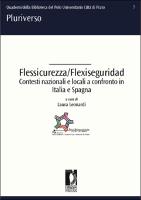Flessicurezza/Flexiseguridad
Contesti nazionali e locali a confronto in Italia e Spagna
Contributor(s)
Leonardi, Laura (editor)
Language
ItalianAbstract
The strategy of flexicurity was adopted as a model by the European Union and proposed to all the Member States as a solution for addressing the challenges connected with the competitiveness and instability of the markets, with a view to enhancing employment levels and maintaining social cohesion. The various contributions in this book analyse the concept of flexicurity and its effective feasibility in different institutional contexts, in particular Italy and Spain and – at regional level – in Tuscany and Catalonia. The consequence of the variety of employment and social security models is that the meanings and manifestations of flexicurity are highly divergent, even in cases as analogous as Spain and Italy, since the different contexts generate significant differences. The overall analysis demonstrates that the forms of regulation and organisation of the social institutions, and their complementary nature, have a major impact on the relations between forms of flexibility and security, and do not always give rise to the virtuous process of flexicurity.


 Download
Download Web Shop
Web Shop